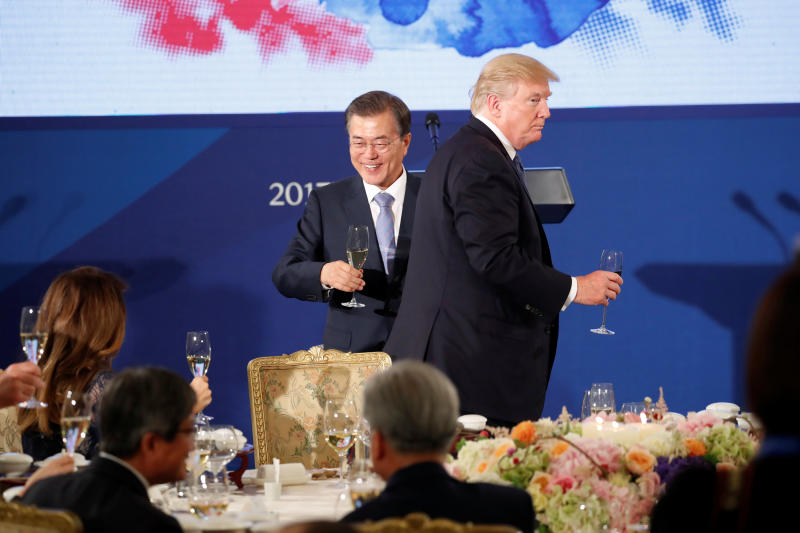Moon Jae In: The man who brought Donald Trump and Kim Jong Un to the table
Sign up now: Get insights on Asia's fast-moving developments

South Korean President Moon Jae In hosting US President Donald Trump to a state dinner at the Blue House in Seoul on Nov 7, 2017.
PHOTO: REUTERS
Follow topic:
SEOUL (BLOOMBERG) - Moon Jae In set his mind on South Korea's presidency nine years ago, when his ailing role model, Nobel Peace Prize recipient Kim Dae Jung, pulled him close and urged him to keep fighting for peace with North Korea.
Soon after, Kim, the first South Korean leader to visit Pyongyang, was dead.
Moon found himself among a core of acolytes determined to preserve Kim Dae Jung's "Sunshine Policy" toward North Korea. The former president's plea rang in Moon's ears, even as the latest US-led efforts to disarm the regime and end their unfinished war unravelled.
"That was the decisive moment," Moon told a group of reporters before his May 2017 election. "He spoke those words as if they were his will."
Twelve months into his tenure as president, Moon is on the verge of a breakthrough to outdo his famous predecessor: Orchestrating an unprecedented summit between US President Donald Trump and North Korean leader Kim Jong Un.
It's an encounter so fraught with consequence that it threatens to overshadow Moon's own historic meeting with Kim planned for Friday (April 27), the first time a supreme leader from Pyongyang will set foot across their militarised border.
The summits are the best shot at resolving the 68-year Korean War since Kim Dae Jung's landmark trip north almost two decades ago.
The stakes are even higher this time, since Kim Jong Un is believed to be on the cusp of developing a missile capable of delivering one of his estimated 60 nuclear bombs to any city in the US - a step Trump has threatened war to stop.
This is the moment Moon, 65, has spent his life preparing for.
Born in a refugee camp to parents who fled the north, Moon served as President Roh Moo Hyun's chief of staff during the last inter-Korean summit in 2007 and watched the goodwill implode amid Kim Jong Il's weapons tests.
"Moon certainly realises the implications of any negotiations," said Timothy Rich, an associate professor of East Asian studies at Western Kentucky University. "Moon potentially can play the role of 'fixer' for setting the stage of what can be discussed."
In recent days, Kim announced that he would extend his freeze on weapons tests and dismantle a key nuclear facility before meeting Moon. Meanwhile, Moon said the North Koreans have also dropped demands for the withdrawal of US forces.
While the gestures may stem from Kim's desire to reduce sanctions and exploit divisions between his rivals, they also demonstrate Moon's success as a moderating force between two volatile leaders.
Last year, as Trump warned that he was willing to "totally destroy" North Korea and Kim Jong Un threatened to reduce Seoul to a "sea of fire", Moon charted a course to bring them together.
He embraced Trump's call for "maximum pressure" and participated in demonstrations of military might with his US allies. At the same time, he pledged to "put everything on the line to stop war" and highlighted the benefits of reconciliation.
"The ultimate goal is the mutual prosperity of South Korea and North Korea," Moon said last Thursday in Seoul. "Whether it's denuclearisation or peace, what we are trying to have is mutual prosperity."
OLYMPIC DETENTE
After almost seven decades apart, South Korea's economy is about 45 times larger than its northern neighbour, fuelled by global manufacturing giants such as Samsung Electronics and Hyundai Motor. Developing North Korea's natural resources and labour market could be a boon for both sides.
Moon's approach represented a sharp departure from the hardline take of his disgraced predecessor, former president Park Geun Hye, the daughter of South Korea's former dictator Park Chung Hee.
In July, Moon outlined his path to peace in Berlin - the once-divided German capital where Kim Dae Jung outlined his own reconciliation plan - and invited North Korea to the Winter Olympics in Pyeongchang.
Rapprochement still seemed remote as Kim Jong Un shocked the world with an escalating series of weapons tests. In a September tweet, Trump lamented South Korean "appeasement".
By December, the region buzzed with talk that Trump was considering a limited, "bloody nose" strike on North Korea - risking retaliation against the 25 million people of greater Seoul. Suddenly, on New Year's Day, Kim accepted Moon's offer to join the Winter Games.
Moon seized on the Olympic goodwill. With a flurry of talks, meetings and gestures, he not only ensured a peaceful Games, but secured Kim Jong Un's first agreement to discuss "denuclearisation" with the US.
In March, Trump stunned everyone by agreeing to discuss the issue with Kim - in person. While Moon's strategy draws heavily from the "Sunshine Policy" playbook of his late mentors, he has sought to avoid their mistakes.
He has insisted that talks focus first on the nuclear threat - the US' chief concern - before the economic exchanges that he and Kim want.
Getting the summits right could open the door to peace, and provide an immediate boost to Moon's efforts to revitalise South Korean growth and reduce the influence of the country's corporate giants.
Failure risks a destructive war that could quickly consume much of Asia.
"The nuclear stand-off with the US has never taken on greater urgency than now and Moon knows nothing is going to happen between the Koreas unless that is addressed first," said Lee Jong Seok, who served as South Korea's unification minister under Roh.
"His meeting with Kim is a stepping stone for Trump to walk on."

